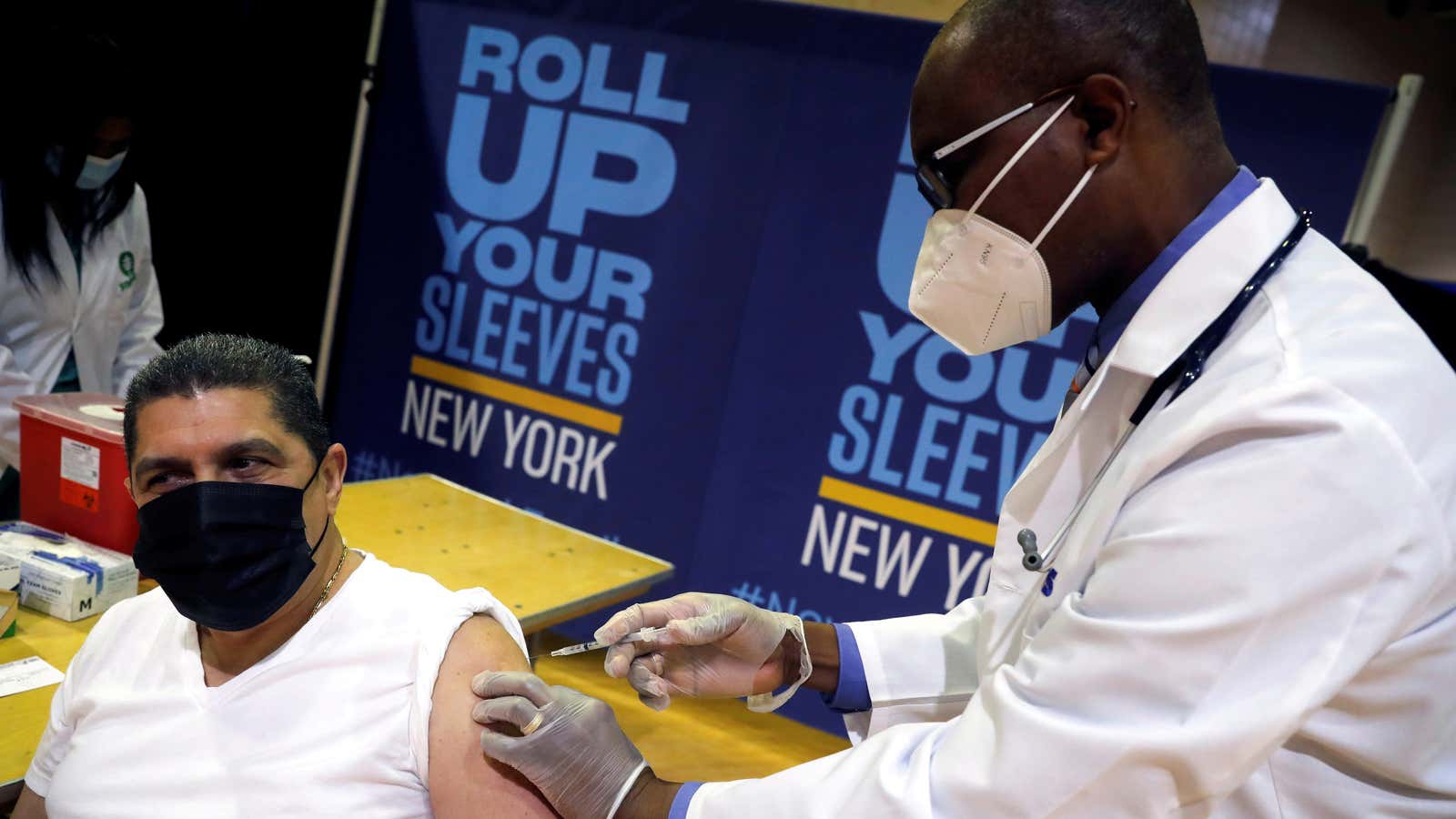Even as major companies like Disney, Google, and Walmart adopt vaccine mandates, there are a number of reasons why some US employers are staying away from them.
Some say they’re afraid of lawsuits, despite the fact that the Equal Employment Opportunity Commission has clarified that workplace vaccine mandates are legal. Others are afraid to lose staff, not a trifling concern considering that frontline workers in the retail and service industries had been leaving jobs at record rates this spring—and lower-income Americans are also most likely to be vaccine-hesitant.
New research from Qualtrics suggests it’s true that companies might alienate workers if they require vaccines. The portion of Americans who say they would consider leaving their jobs if their workplaces made vaccination necessary has ticked upward, from 39% in March to 44% in August. (Qualtrics surveyed a representative sample of more than 1,000 working adults.)
But employers may also want to consider another risk: The same Qualtrics survey shows that 38% of workers would consider leaving their current employer if the organization did not enact a vaccine mandate.
Ben Granger, an organizational psychologist at Qualtrics, says these findings describe a tug of war playing out inside many companies. Some people say they want their employers to mandate inoculation so they’ll feel safer around their peers, while others believe that an employer shouldn’t have that much influence over a person’s vaccination decision. “The internal struggle is real,” he says.
Gen Z is most likely to support vaccine mandates at work
The majority of US workers still support vaccine mandates, according to Qualtrics, though the share who say they’re in favor of ultimatums slipped to 60% in August, compared to 66% in March.
Among the smaller subset of people who say they not only approve of workplace mandates but would consider quitting without one, 14.3% said they’d “strongly” consider leaving, while 23.2% would “somewhat” contemplate it.
Gen Z workers, who are aged 25 and younger, were most likely to say they would weigh bidding their employers adieu if their colleagues didn’t face a vaccine mandate: 48% of those surveyed from that demographic expressed that view, compared to 39% of millennials (aged 26 to 40), 36% of Gen X employees (aged 41 to 55) and about one-third of Boomers (aged 56 and older).
Willingness to consider quitting without a mandate was more prominent among men (43%) than it was among women (32%), and among Democrats (51%) compared to Republicans (27%).
Employers in tech have special reasons to pay attention to these findings. More than half (56%) of respondents in that field said they might walk if there was no mandate in place at work, while 34% of retail employees and 21% of those with government jobs said the same thing. Tech workers showed strong support for vaccine mandates overall, with about three-quarters of workers expressing approval of the idea.
What companies should know about vaccine mandates
Qualtrics did not collect data that would explain why Americans’ support for vaccine mandates at work is slipping. It’s worth noting, though, that the new survey was conducted just after new insights into the contagiousness of the delta variant began circulating at the end of July.
Data from the US and elsewhere suggests that although unvaccinated people remain the most at risk from the delta variant, it’s also true that fully vaccinated people who become infected with the variant can come down with milder cases of Covid-19 and still spread it to others (though for a shorter time period compared to unvaccinated persons).
The vaccines remain effective at preventing hospitalization and death from Covid-19. But for people who were already hesitant to get vaccinated, news about the delta variant may have muddied their decision-making.
Ganger’s “educated guess” is that this confusion is playing into the push and pull over mandate support. These conversations, he adds, are playing out very differently in regions across the US, creating conundrums for large companies.
“It is incredibly complex,” says Granger. But as more companies take a pro-mandate stance, “I think you’re going to see more and more companies jump on that bandwagon and make the argument that ‘Hey, even though you know there’s a subset of our employees who may feel like it’s wrong for a company to mandate, everybody else is doing it.'”
His advice to business leaders who are still undecided about their vaccine policy is to communicate with employees even if there’s not a directive yet. Rather than leave staff in the dark, explain how the leadership team will make the call and what information it is relying upon, because “people are really good at adapting to change, but people are not good at dealing with uncertainty.”
He also suggests emphasizing that any new company rule could change again within months or a year, since the future of the pandemic remains unpredictable.
